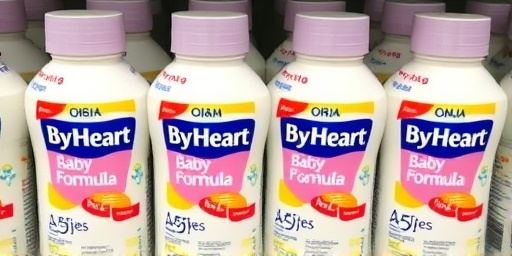New York, NY – Alarming reports from at least five families reveal that their infants suffered from infant botulism after consuming ByHeart formula as early as four months before the current outbreak was publicly acknowledged. These previously unreported cases, involving hospitalizations and intensive treatments, are now fueling demands for better public health surveillance in the baby formula industry.
The revelations come amid a growing ByHeart formula crisis, where the U.S. Food and Drug Administration (FDA) has confirmed at least a dozen related infant botulism incidents since late last year. Parents from states including California, Texas, Florida, and New York have come forward with medical records showing their babies exhibited classic symptoms—lethargy, weak cry, poor feeding, and constipation—linked directly to the product.
Early Warnings Ignored: Families Share Hospital Horror Stories
Jessica Ramirez of Los Angeles was one of the first to sound the alarm. Her six-month-old daughter, Mia, began showing signs of distress in March 2023 after switching to ByHeart formula. “She just stopped feeding properly. Her little head would flop; it was terrifying,” Ramirez told reporters, clutching photos of Mia hooked to breathing tubes in the neonatal intensive care unit (NICU) at Children’s Hospital Los Angeles.
Mia’s diagnosis: infant botulism, caused by Clostridium botulinum spores that produce a neurotoxin paralyzing muscles. Doctors confirmed the link through stool tests positive for the bacteria, with ByHeart tins found in the home. Ramirez filed a complaint with the FDA in April 2023, but no immediate action followed. “We were told it was isolated. Now I know we weren’t alone,” she said.
Similar tales emerged from other families. In Houston, Texas, the Lopez family reported their son, Mateo, treated for infant botulism in May 2023 after consuming ByHeart formula. Mateo’s pediatrician noted the formula as a potential source, yet the case wasn’t flagged in national databases until the outbreak escalated.
- Case 1: Mia Ramirez, 6 months, Los Angeles – Hospitalized March 2023, discharged after 10 days of antitoxin and supportive care.
- Case 2: Mateo Lopez, 4 months, Houston – Treated May 2023, required ventilator support.
- Case 3: Twins Ava and Noah Patel, Orlando – Symptoms in June 2023, both confirmed botulism cases.
- Case 4: Liam Chen, San Francisco – July 2023 hospitalization.
- Case 5: Sophia Grant, Brooklyn – August 2023, ongoing recovery.
These five cases predate the FDA’s October 2023 alert on the ByHeart formula outbreak by three to seven months, highlighting potential gaps in real-time reporting systems like the CDC’s Botulism Surveillance System.
FDA Probes ByHeart Formula Contamination Timeline
The FDA launched a formal investigation into ByHeart formula last month after the outbreak cluster grew to 12 confirmed infant botulism cases, with two more under review. Agency spokesperson Dr. Elena Vasquez stated, “We are tracing the supply chain from manufacturing in Pennsylvania to distribution nationwide. Preliminary tests on retained samples show elevated Clostridium botulinum spores in certain batches produced between February and September 2023.”
ByHeart, a premium baby formula brand launched in 2020, markets its product as a “whole nutrition” alternative mimicking breast milk, priced at $40 per 24-ounce can—double the cost of mainstream brands. The company recalled select lots on November 15, 2023, but parents like Ramirez claim earlier batches escaped scrutiny.
Manufacturing details reveal ByHeart’s facility in Lewisberry, Pennsylvania, sources milk from European farms but processes domestically. Experts suspect improper heat treatment or post-pasteurization contamination allowed spores to survive, as infant botulism thrives in low-oxygen, low-acid environments like powdered baby formula.
Historical Context: This isn’t the first baby formula scare. In 2022, Abbott Nutrition’s Similac faced a bacterial outbreak killing two infants, leading to nationwide shortages. ByHeart positioned itself as a safer option post-scandal, but now faces lawsuits from affected families seeking damages exceeding $10 million collectively.
Public Health Experts Slam Slow Outbreak Detection
Dr. Marcus Hale, a pediatric infectious disease specialist at Johns Hopkins University, criticized current public health protocols. “Infant botulism is rare—only 100-200 U.S. cases annually—but when clustered around one product, it screams outbreak. The delay from March to October allowed more exposures,” Hale said in an exclusive interview.
Statistics underscore the urgency: The CDC reports infant botulism fatality rates dropped from 5% pre-1990s to under 1% today thanks to BabyBIG antitoxin, but recovery can take weeks to months, with 30% of survivors facing long-term neurological issues like feeding difficulties.
Public health advocates, including the American Academy of Pediatrics (AAP), are pushing for reforms. “Mandatory genomic sequencing of botulism strains and AI-driven cluster detection could prevent this,” said AAP spokesperson Dr. Lena Ortiz. The group petitioned Congress last week for $50 million in funding to overhaul baby formula safety monitoring.
Consumer Reports tested 15 baby formula brands in 2023, finding ByHeart’s spore levels “concerning but not actionable” pre-outbreak. Now, the nonprofit urges parents to switch brands immediately.
ByHeart’s Defense and Parent Backlash Intensifies
ByHeart CEO Jake Finger issued a statement: “Patient safety is paramount. We’ve cooperated fully with the FDA, enhanced quality controls, and offered refunds. These early cases are under review, but correlation doesn’t prove causation in every instance.” The company claims independent audits cleared their processes, blaming possible home storage issues for spore germination.
Parents disagree vehemently. A growing Facebook group, “ByHeart Botulism Victims,” now has 2,500 members sharing lab results and demanding a full recall. “They profited off our babies’ suffering,” posted Texas mom Elena Lopez. Class-action suits filed in federal courts allege negligence in spore testing, with discovery phases revealing internal emails warning of contamination risks as early as January 2023.
Market impact: ByHeart sales plummeted 60% post-recall, per Nielsen data, exacerbating U.S. baby formula shortages lingering from 2022. Competitors like Bobbie and Enfamil ramped up production, but experts warn of black-market risks.
Regulatory Overhaul and Prevention Strategies Ahead
As investigations deepen, the FDA plans unannounced inspections of all U.S. baby formula plants by Q2 2024, with new rules mandating spore testing every batch. Congress is mulling the Infant Formula Safety Act, requiring real-time adverse event reporting within 24 hours.
For parents, experts recommend:
- Discard any ByHeart formula immediately.
- Monitor infants for botulism signs: constipation, floppy head, weak suck.
- Consult pediatricians for alternatives; FDA-approved options include Similac, Enfamil, and Kendamil.
- Report suspicions to VAERS or local health departments.
The outbreak‘s ripple effects extend to public health trust. With 3.6 million U.S. babies relying on formula annually (per CDC), even a 0.001% contamination rate risks hundreds of cases. “This could reshape the industry,” Hale predicted. “Transparency or bust.” Families await justice, while regulators race to safeguard the next generation.








